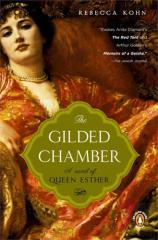Reading Group Guide
Discussion Questions
The Gilded Chamber

1. Queen Esther is a little-known figure to many people. How much did you know about her before reading this book? Were you surprised to learn there was such an important queen in such an ancient court and such a strong heroine in the Bible? Why do you think her story has not been as popular as those of other biblical figures?
2. As queen, Esther is part of a decadent world of beautiful clothes and jewelry, of abundant, exotic food and choreographed ritual. If you had such wealth lavished upon you, do you think it would be easy to forget other values? What enables Esther to remember that riches are not the most important part of life? Think back to her reaction upon seeing her friend Freni a few years into her reign or the types of people that she befriends in the court. How does she keep herself from becoming a slave to her surroundings?
3. At times it is easy to forget that Esther, the pampered queen, is also a slave forbidden to leave the palace confines. Think back to moments when Esther tastes fresh air, such as when she gains access to the courtyard garden. How would it feel to always be indoors and never allowed out? What senses or sense of possibility might lessen or be lost?
4. Consider some of the other women in the harem, from Esther's peers to the dancing girls to the banished Queen Vashti. When Esther first arrives at the harem, she is put in a room with three other young women who have been taken from their families. What is the fate of each of these women? How do they, and the other members of the harem, cope with their situation? What do you think would be the best way to behave in such a world, or is compromise the only option?
5. The disparity between the extravagances of the court and the daily life of the king's subjects is alluded to many times in the novel. What are some of the material and physical differences between those who live within the palace and those who live without? How does Esther respond to those differences?
6. Esther is torn between her desire to stop the decree against the Jewish people and her need to maintain her own safety and that of those that she cares about and already has responsibility for, such as Vadhut and Puah. Though she has limited options, Esther in her own way has power. Think back to some points in the novel when she exercises that power. What would you do in her position?
7. One of the most interesting problems in the book is the need for various characters to hide their Jewish origins. Puah, Freni, Mordechai, and Esther all keep their identities secret. What is at stake for them in muting their backgrounds? What strategies do they employ for maintaining their faith and their heritage? What factors drive some of the characters to finally reveal their religion?
8. This is quite a realistic love story, in which emotional relations are complicated by issues of gender and power. Though Esther loves Mordechai, he is somehow unable to give himself to her; though Esther is attracted to the king, she cannot ever fully love him. What does Esther gain from each of these men, and what does each deny her? Who do you think she is more suited for?
9. Esther is genuinely attracted to King Xerxes and is sympathetic to him even when he makes abominable errors in judgment—and in spite of the reality of her own position as his veritable slave. What does it say about her character that she is able to overlook such flaws? Consider how in so many ways she is strong while he is weak and easily manipulated. What would the court have been like without her influence?
10. Why doesn't Mordechai marry Esther when she comes of age? Do you see any connection between his secrecy about his Jewish identity and his inability to embrace her as his wife? Does he change over the course of the novel? Do you think that he does love and wish to marry Esther? Does the end of the story bring him redemption?
11. Consider Kohn's opposition of material and spiritual satisfactions. As queen, Esther enjoys tremendous luxury: she is physically pampered, well fed, and even loved. What does her life lack? What does she need to gain by the end of the novel in order to be fulfilled?
12. The novel ends with Esther embarking on a new phase in her life. Can you imagine what that life might be like? Would it resemble more her life as queen or her earlier, simpler life as Mordechai's dependent? What aspects of daily life do you think she values most?
The Gilded Chamber
- Publication Date: July 26, 2005
- Paperback: 353 pages
- Publisher: Penguin (Non-Classics)
- ISBN-10: 0143035339
- ISBN-13: 9780143035336







